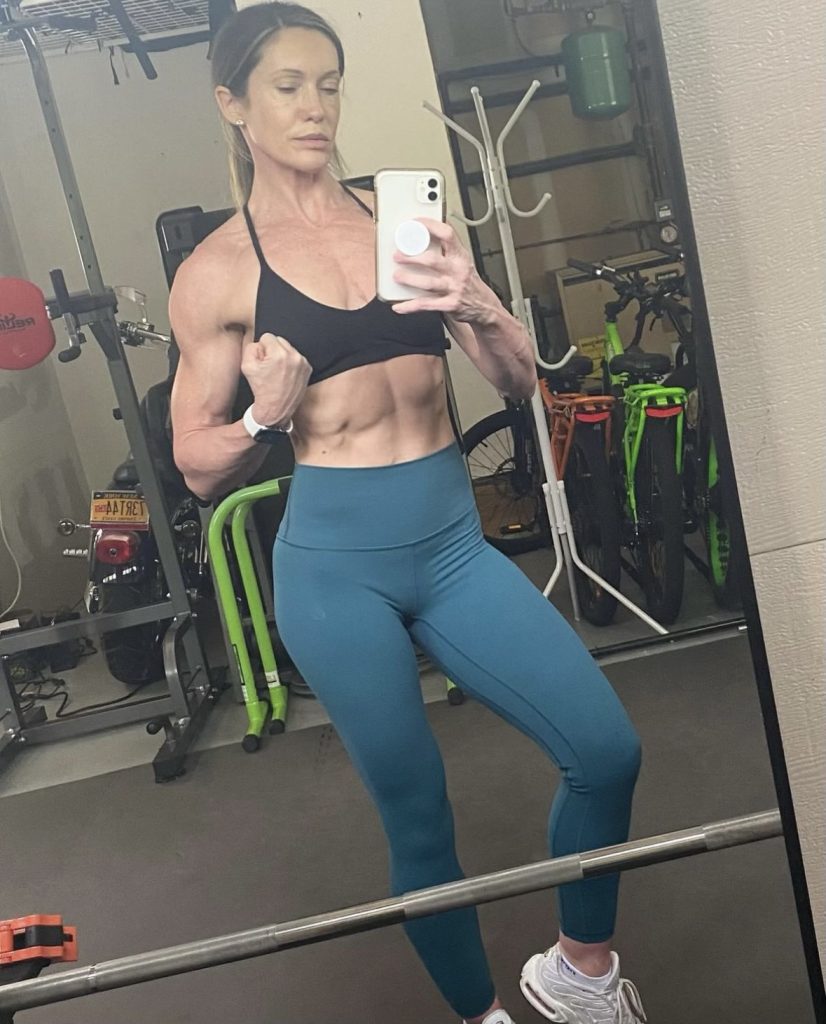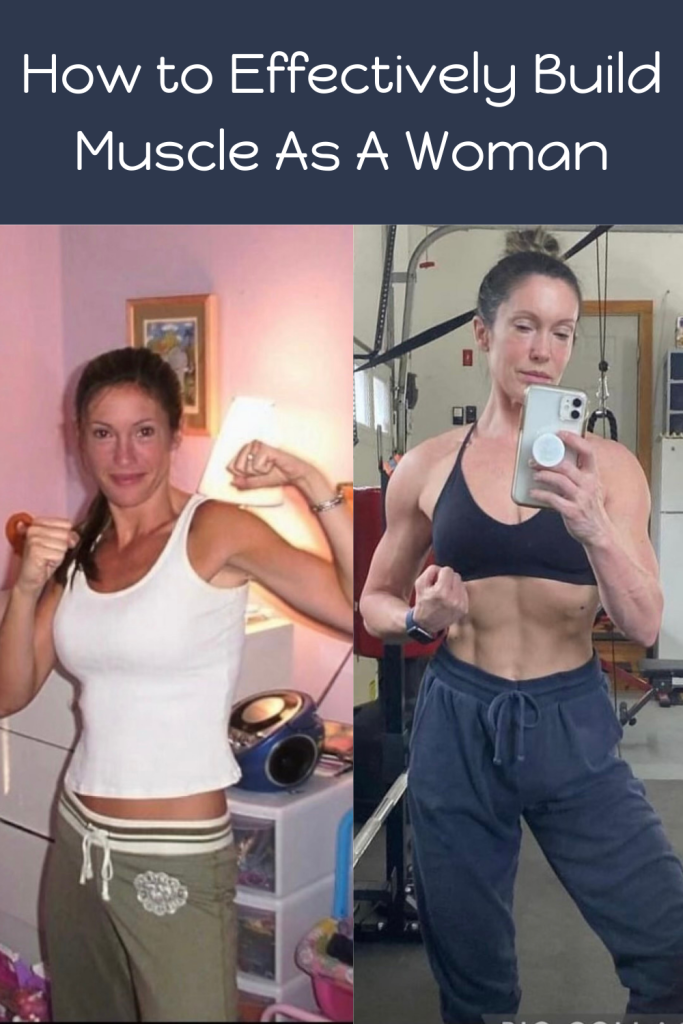Are you the gym everyday and feel like you’re working your absolute hardest, but aren’t gaining any muscle or seeing much progress? I know how frustrating that can be. However, the answer to your problem is probably easier than you think. You might just need to change your strategy. And luckily that strategy is to work smarter not harder.

The simple answer is to eat balanced meals consisting of healthy whole foods and lift weights. Then you just turn that into your lifestyle. But we’re going to get into the details of that a bit more.
These tips can help you create a sustainable and doable routine with working out that will allow you to reach your goals, build muscle and continue seeing results week by week. You might even realize that you can do all of this without feeling overwhelmed and find the process enjoyable.
Plus once you see small amounts of change and progress, the results will just continue to snowball from there as you become more motivated to keep going.
How to Build and Maintain Muscle:
- Strength training – lift heavy/progressive overload
- Eat enough protein
- Eat enough food
- Stay consistent/have a plan
- Rest and recover
Keep reading as we dig into the specifics of these below.
First of all, let’s get some things straight about lifting weights:
What are the benefits of strength training?
Lifting weights can help with insulin resistance, hormone stability and even digestion. Having more muscle on your body can make everyday tasks feel easier. Take for example lifting a toddler off the floor. Guess what? That’s squatting with weight and if you already have the proper form and movement patterns down, you will be able to do that simple task all day long and it could feel easy instead of draining. Even if you don’t have kids, moving through life with a strong body can be so helpful.
But will I get “bulky” if I lift weights?
I’m sure you have heard the words, “but lifting weights will make you bulky” many times, especially if you are a women, but trust me when I say, you most certainly will not. It would actually take quite a bit of effort to bulk up to that extent just by lifting weights. With a proper diet and workout plan, you can obtain the physique you have always dreamed of, feel strong and empowered and most importantly, you will be taking your longevity into your own hands.
Resistance training and having muscle on your body is very important especially as you age so that you can keep up with your kids and grandkids, you can still do all of the activities and hobbies you love when you’re in your older years. My grandparents still love to ski and they’re almost 80 years old all because they stayed active!
Can I build muscle with just home workouts?
Absolutely! I (Sange) only work out at home with adjustable dumbbells and see great results, as long as I stick to a plan and follow the tips below.
Can I build muscle after 50?
100 times yes. Alex is a personal trainer and competes in bodybuilding competitions (see her transformation below). No matter your age, your skill level, how many children you’ve had, injuries you’ve overcome, resistance training can be for you. You may need to work in some modifications, but anyone can build muscle.

Now for the specifics – here are some guidelines to follow if you want to start putting on muscle:
Strength Training – Lift heavy/Progressive overload
Now you know the benefits of lifting weights as mentioned above, but just randomly picking up different weights without a plan isn’t going to get you very far. You might see some results at first, but in order to maintain the muscle and create a sustainable routine, you need a progressive plan.
If you can lift the weight easily and endlessly, you’re not going to see results. Pick a weight where you can do 6-12 reps and the last couple are towards failure, then try to increase the weight as time goes by. Make sure you have a good foundation and learn proper form before going up in weight. It can be helpful to seek out a personal trainer or go to a class in the beginning so that you can learn. It is also a good idea to work on mobility in conjunction to lifting weights to be sure you have a decent range of motion while lifting and will not injury yourself.
Eat enough protein
Most people are not getting enough, aim for consuming at least 1g of protein per pound of body weight. Be sure to balance every meal with protein, carbs and fat. This ratio will be different for everyone depending on your metabolism, lifestyle and health history. This will also depend on your goals, whether it is to get stronger or you have a particular physique goal in mind.
Eat enough food
You need to fuel yourself in order to build muscle. It’s helpful to track your food even just for a little while to get an idea of how many calories you’re consuming and what you can change to reach your goals. The My Fitness Pal app is our favorite to use for this. You can even use it to track how much protein you’re getting in and the ratios of macros you’re consuming.
Stay consistent/have a plan
You don’t need to weight train every day. Start with a few days a week and stick with them. That’s when you will start to see the results. Taking on too much can feel overwhelming and lead to you giving up after a while. You want to add this into your lifestyle.
Rest and recover
A commonly missed, but just as important step to putting on muscle. Getting enough sleep every night, taking rest days, resting between sets and listening to your body and taking it easy if you need to all fall under this category. You don’t need to train 7 days a week. Allowing yourself to rest and recover will help with muscle growth and prevent burnout.
Frequently Asked Questions:
How much protein do I need to build muscle?
Aim for consuming at least 1g of protein per pound of body weight.
Does cardio build muscle?
No, you can do cardio all day everyday, but unless you’re resistance training and taking in enough calories, you’re not going to gain muscle. However, cardio has its benefits as well and it’s important to have a balanced routine. Find a source of cardio you like and incorporate it, but don’t expect to see muscle growth.
How long does it take to build muscle?
This answer is going to be different for each individual person. What is your calorie intake? Are you a beginner? How intense are your workouts? How many days a week are you working out? There are so many factors that play into this. That being said, most individuals who incorporate a weight lifting routine will see some sort of muscle growth or results in a few weeks to several months.
Will I lost weight by strength training?
Strength training in itself will not lead to weight loss, but with proper diet, protein intake and weight training you can change your body composition and lose body fat. That means you could lose inches, but the scale might not move. You have to be in a calorie deficit to lose weight.
How many days a week do I need to train to see results?
Ideally 3-5 days a week is going to get you the most significant results. It is important to remember that the best routine for you is going to be the one that you can stay consistent with. If that means only lifting weights 1 or 2 times a week, then that is perfect and is going to absolutely be better than nothing. Do what you can, be consistent with it and the results will come.